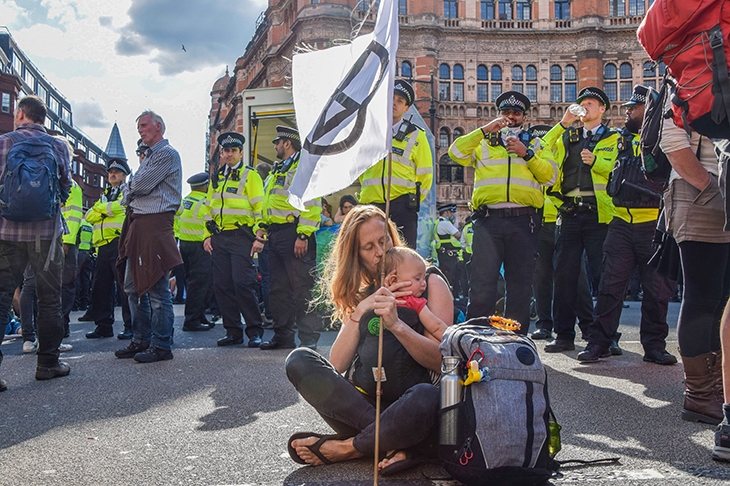The concept of normality has been so disrupted over the past 18 months that the Extinction Rebellion protests — usually designed to stop people getting to work — are unlikely to have as much of an impact as they did. Even so, businesses which are trying to recover from the pandemic find themselves once again cut off from their customers. Bus routes are disrupted and commuters are impeded from getting to work — and for far longer periods of time than with traditional protests.
The group appears to have acquired a new confidence thanks to a Supreme Court ruling in June which quashed the convictions of four protestors who obstructed the entrance to an arms fair at the Excel Centre in east London in 2017. The court ruled that the protest had not lasted long enough to cause serious disruption, and therefore there was no justification for charges under nuisance laws. The judgment has since led to a couple of Extinction Rebellion protestors having their own convictions quashed — although many others against members of the group still stand.
As far as Extinction Rebellion is concerned, the Ziegler judgment (as it has been named, after one of the protestors involved) has enshrined the right to occupy streets and disrupt the lives of ordinary citizens at whim. The police take a different view: there is a requirement to balance the right to protest with the rights of others to go about their business. Just where this balance is struck now is anyone’s guess. Extinction Rebellion’s occupation of Oxford Circus in April 2019 was tolerated for a fortnight, with some police officers filmed dancing with the protestors as if it were a street carnival.
The police cannot be blamed if the law is confusing. Updating unclear laws is the job of parliament, which is now considering new legislation granting more powers to police to break up illegal protests. Contrary to claims by some who oppose it, the bill does nothing to prevent individuals and protest groups from expressing their political views; it deals with public order matters, revolving around the principle that everyone has the right to protest, but not to prevent others from living their lives. Extinction Rebellion seems to take this for granted, given its members have obstructed newspaper printing plants and glued themselves to the sides of trains.
Others will take their cue from all this. We have seen, in recent weeks, anti–vaxxers targeting ITN headquarters and the former headquarters of the BBC in Shepherd’s Bush. It’s easy to condemn that: there is no right to trespass on private property to promote conspiracy theories. But nor should there be a right to trespass for noble causes. Rights do not depend on politics. Police cannot be expected to weigh up a political argument in deciding whether to tolerate or disrupt a protest. If Extinction Rebellion is allowed to go after commuters, then it wins this right for other groups with darker objectives.
It is not just absurd, but also dangerous, to expect police to make political decisions and choose what behaviour they should tolerate from which protestors; it risks undermining the trust between the police and the public. Cressida Dick, Commissioner of the Metropolitan Police, was furious with officers who took the knee before Black Lives Matter protests — but she kept her fury private. That is a shame, because it allowed the perception of politicised policing to deepen. All of this is manna for conspiracy theorists and political extremists, and it undermines general faith in the rule of law.
Since its inception, Extinction Rebellion has appeared to work on the principle that its cause is so right, and so urgent, that the end justifies any means. This, needless to say, is what many protestors feel about their favourite cause. If every group acted with impunity, justifying its behaviour with a sense of urgency, chaos would ensue. Extinction Rebellion’s belief is that its message is indisputable, so its actions are justified. But their premise is wrong. While many will sympathise and support calls for a greener planet, many of the group’s claims — such as that humans face pending extinction as a result of climate change — are not justified by the evidence.
The evidence, instead, points towards a United Kingdom that is decarbonising at a headlong pace — cutting air pollution, water pollution and the general use of resources at the same time as growing the economy. UK emissions have fallen 41 per cent since 1990, while the economy has grown by 78 per cent, the fastest progress of any major country. Parliament has committed to net-zero emissions by 2050 (itself a target that will push the boundaries of technological development and affordability).
The group’s central demand — that the government reaches net zero within four years — is patently absurd and could only be achieved by condemning Britain to pre-industrial poverty. It would also achieve almost nothing, given that so many other nations where Extinction Rebellion is not active will merrily continue spewing emissions as before.
Still, we defend to the last ditch the right of Extinction Rebellion to express their views — just not the right to disrupt the lives of everyone else. What we need to do about climate change can be settled by democratic means and rational argument.
Got something to add? Join the discussion and comment below.
Get 10 issues for just $10
Subscribe to The Spectator Australia today for the next 10 magazine issues, plus full online access, for just $10.
You might disagree with half of it, but you’ll enjoy reading all of it. Try your first month for free, then just $2 a week for the remainder of your first year.














Comments
Don't miss out
Join the conversation with other Spectator Australia readers. Subscribe to leave a comment.
SUBSCRIBEAlready a subscriber? Log in